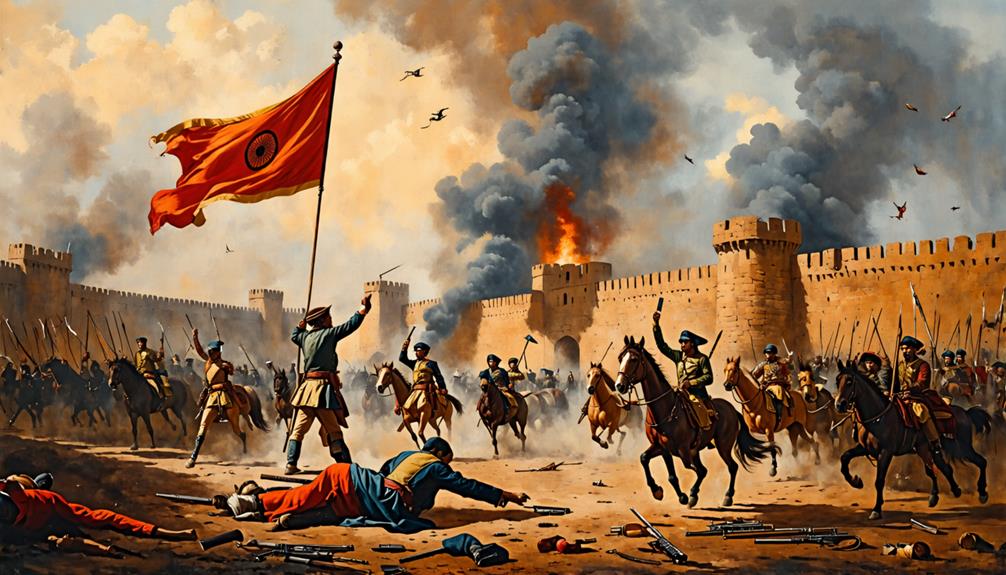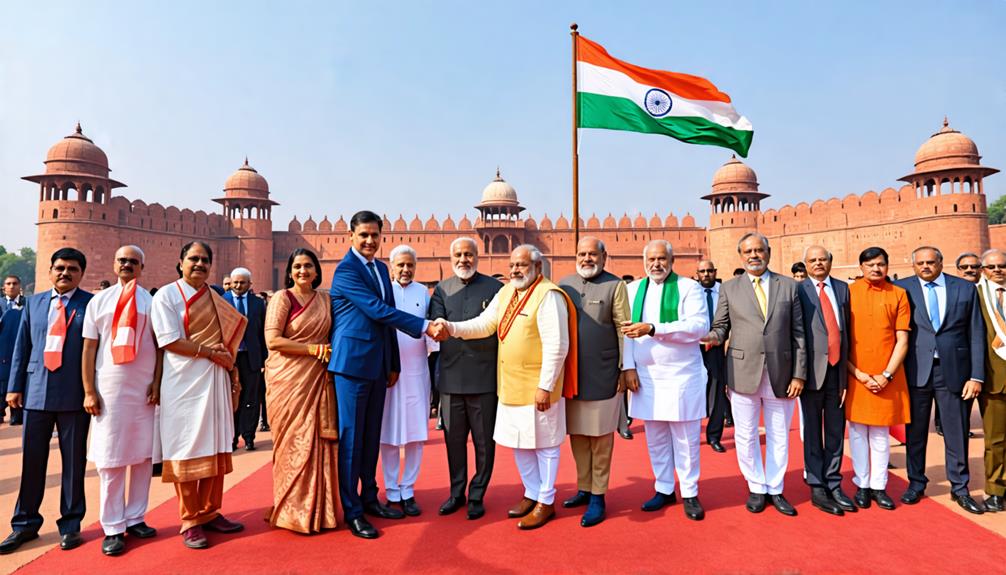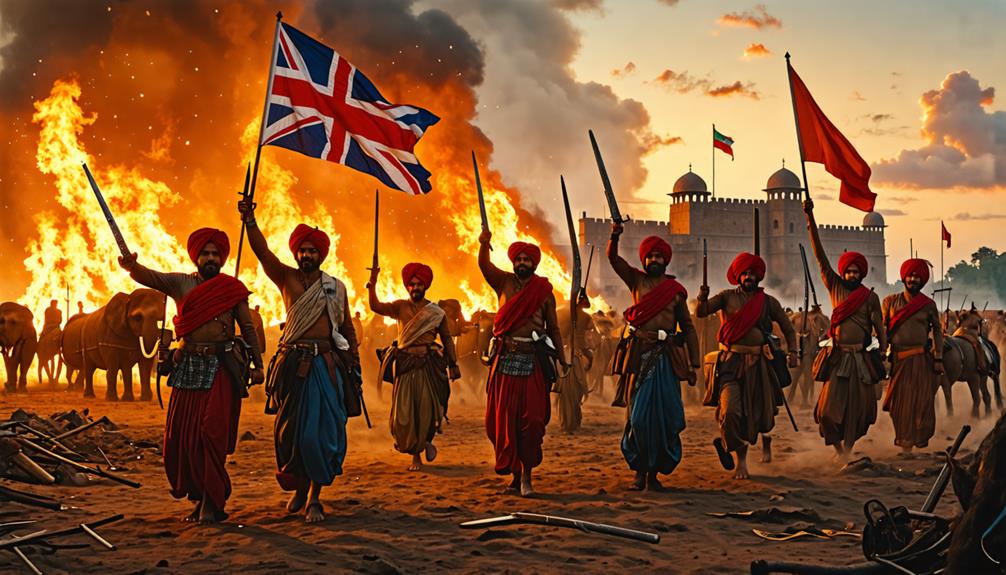In an alternate timeline, the Indian Rebellion of 1857 succeeds in overthrowing British colonial rule. India gains independence nearly a century earlier than in our reality.
The question is, how would this monumental event change the course of history?
One immediate consequence would likely be the establishment of a sovereign Indian government, which could have fostered a sense of nationalism and unity among the diverse ethnic and religious groups within the subcontinent much earlier. This unity might lead to the development of a more cohesive national identity.
Economically, an independent India might have focused on self-reliance, prioritizing local industries and agriculture. This shift could alter global trade dynamics and reduce the economic dominance of Western powers in the region.
Geopolitically, an early independence could have significant implications for colonialism in other regions. The success of the Indian Rebellion might inspire other colonies to resist imperial rule, potentially leading to a more rapid decline of colonial empires worldwide.
Culturally, the early independence movement could have allowed for a flourishing of Indian art, literature, and philosophy, influencing global culture in ways that were not possible under British rule.
Lastly, the effects on modern geopolitics cannot be understated. An independent India in the 19th century might have formed different alliances, impacting the outcomes of both World Wars and the Cold War, thus reshaping the entire international order as we know it today.
Immediate Aftermath

The brutal suppression of the rebellion could have left a deep scar on India's collective psyche, with far-reaching consequences that might've shaped the subcontinent's future.
One theory is that the British would have tightened their grip on power, implementing harsher policies and further exploiting India's resources. It could have meant changes to the relationship between the rulers and the ruled, potentially widening the divide and fueling resentment.
While this scenario didn't occur in the immediate aftermath of the 1857 rebellion, similar events took place during the Jallianwala Bagh massacre in 1919 and the Bengal famine of 1943.
These events, along with the suppression of various independence movements, laid the groundwork for India's eventual struggle for independence.
Political Landscape
In an alternate history where the 1857 rebellion led to a fragmented India, the political landscape might've been drastically different. One theory is that regional powers would have filled the vacuum left by the Mughal Empire, leading to constantly shifting alliances and conflicts between princely states.
It's possible that without a unifying power, India may have remained divided and more vulnerable to foreign influence or even colonization by other European powers.
However, it's also conceivable that one or more of the regional states could have risen to prominence and begun the process of reunification, similar to how Germany and Italy were unified in the late 19th century.
Economic Implications

In an alternative history where the 1857 rebellion in India succeeded, leading to a fragmented subcontinent, it's theorized that economic development would have been hindered.
The newly independent kingdoms and principalities might've implemented their own economic policies and trade barriers, creating a disjointed market that limited growth potential and global competitiveness.
While this particular scenario didn't occur, the partition of India in 1947 did result in the creation of two separate nations: India and Pakistan.
The economic implications of this later division, though different in many respects, also demonstrate the challenges that can arise from political and economic fragmentation in the region.
Social Transformation
Had the Indian Rebellion of 1857 succeeded, it might've sparked significant social changes across the subcontinent. One theory is that traditional power structures, such as royalty and nobility, would have regained their influence.
However, the rebellion's unifying force could have also planted the seeds of nationalism, potentially leading to a more equal society over time, though not without challenges.
It's worth noting that if a similar scenario occurred at a later date led by different individuals, the outcomes might've varied. The specific leaders, their ideologies, and the historical context would have all played a role in shaping the social transformation that followed.
International Relations

The 1857 Indian Rebellion, also known as India's First War of Independence, failing to achieve its goals had significant consequences for the region and the world. However, if the rebellion had been successful, it would have likely led to a very different course of history.
One theory is that a successful rebellion would have greatly weakened Britain's global influence and power projection capabilities. This could have created a power vacuum that other European colonial powers like France, Portugal, or the Netherlands might've tried to fill by expanding their territories in Asia and Africa.
An independent India in the mid-19th century might've sought to forge alliances with rival powers to counter any remaining British influence in the region. This could have dramatically shifted the balance of power in Asia, with India emerging as a major player decades earlier than in our timeline.
Interestingly, although not as widespread, there were some later uprisings against British rule in India after 1857, such as the Ghadar Mutiny in 1915 and the Quit India Movement in 1942. While these also failed to immediately end British control, they contributed to the growing push for Indian independence that was ultimately achieved in 1947.
Long-term Consequences
Had the 1857 rebellion succeeded in expelling the British, India may have seen a very different trajectory. One theory is that India would have unified under local rule, potentially restoring the Mughal Empire. This could have led to accelerated economic development and a cultural renaissance as India charted its own course.
Alternatively, it's possible India would have remained a collection of fractured princely states, each vying for power. The challenges of self-governance and steering the nation into modernity may have proven difficult.
Geopolitically, a successful rebellion would have reshaped the global balance of power, with ripple effects felt around the world.
It's worth noting that India did eventually achieve independence in 1947, though under vastly different circumstances. The impact of the 1857 rebellion, while not immediately successful, played a key role in sparking the Indian independence movement that would come to fruition nearly a century later.
Conclusion
Imagine this: by 1900, India's GDP might've soared to $500 billion under self-rule, double what it actually was.
You'd be living in a world where India, not Britain, could've become the dominant global power.
The rebellion's success would've forever altered India's destiny and reshaped the international order.
It's a fascinating 'what if' scenario that underscores how a single event can dramatically redirect the course of history for an entire nation and the world.

Leave a Reply